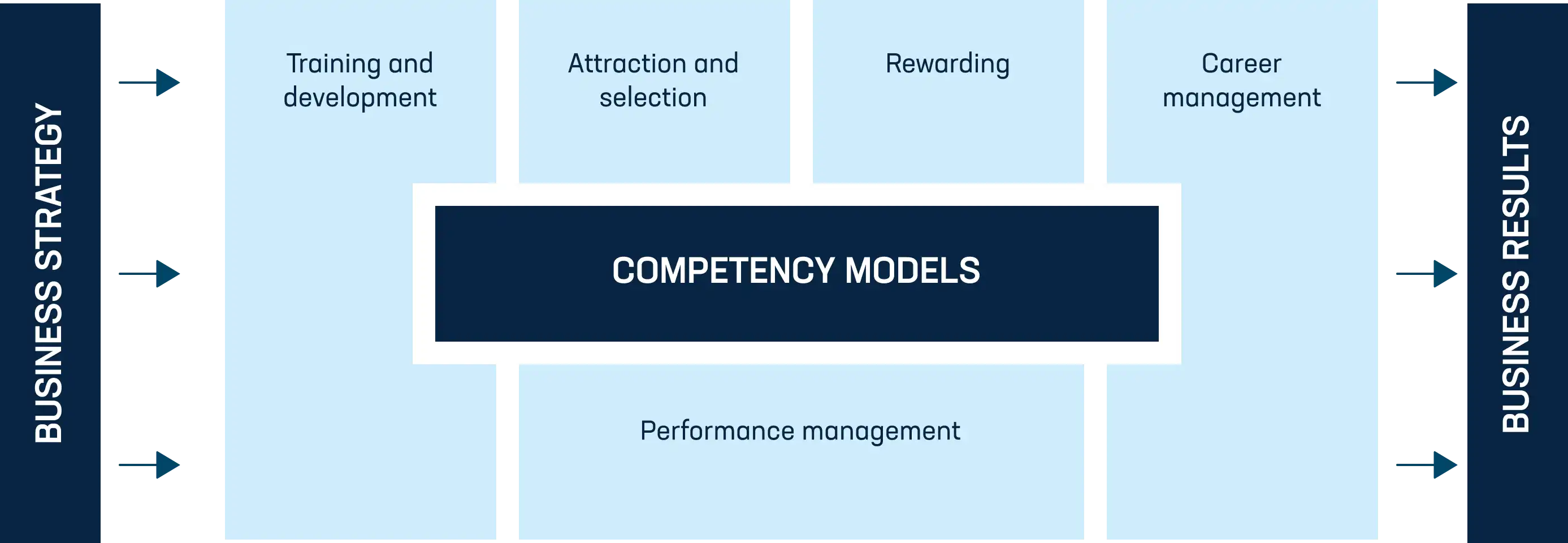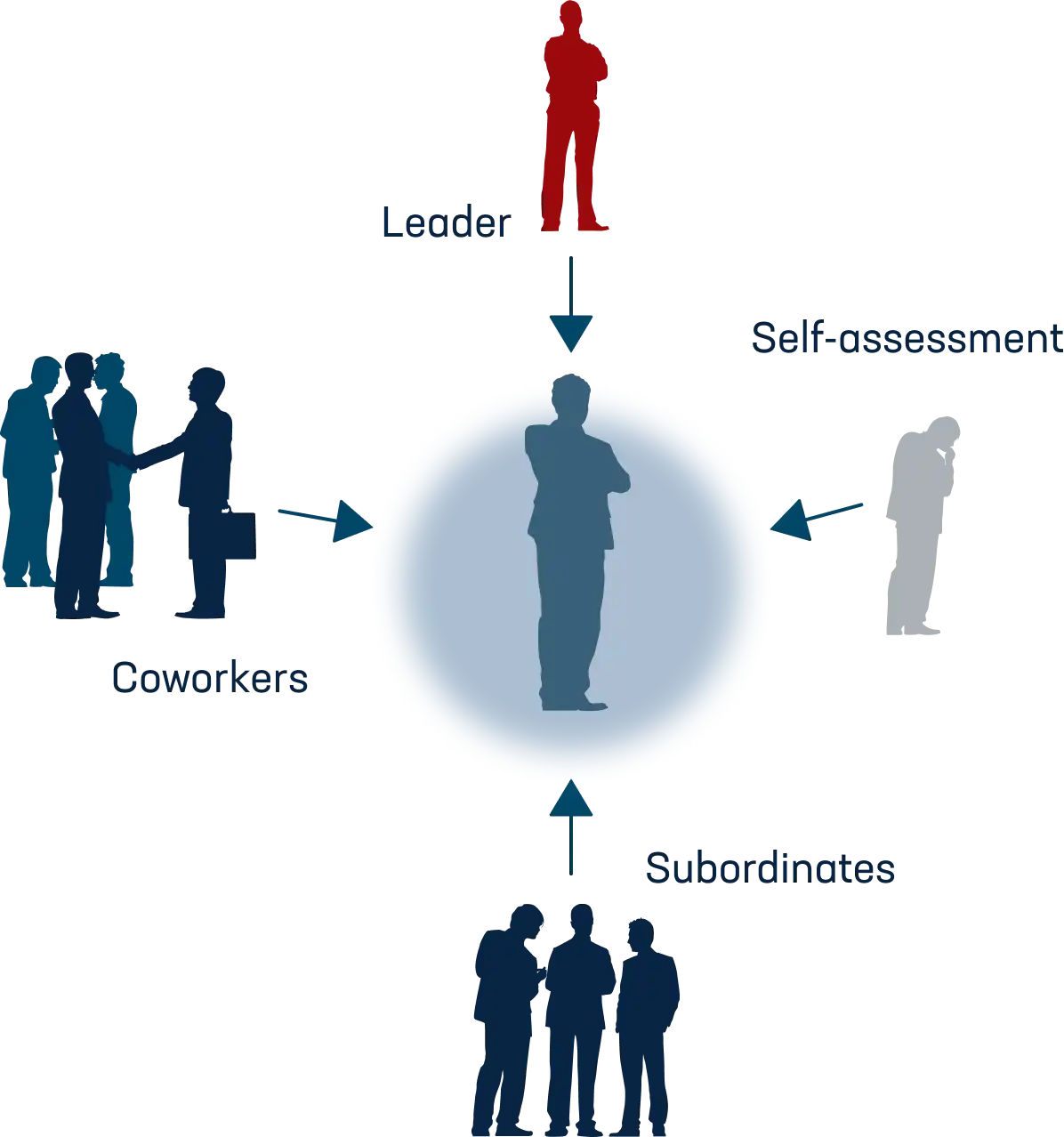Systematic development of competencies
Developing, upgrading, and transferring your employees' competencies into everyday business practice is an important strategic objective. Delays in developing employee competencies carry a significant risk of permanent non-competitiveness.

An organization's fundamental value is the potential of its employees.
The basis for most HR processes
The majority of HR processes are built on competency models. They serve as the foundation for recruitment, performance appraisal, compensation, succession planning, and employee development. Additionally, the competency model serves as a basis for the 360-degree competency assessment.Providing an innovative environment
Companies must constantly innovate in order to be successful. This increases the need for additional knowledge and skills from employees. On the other hand, it enhances the employee experience.Improved change management
Demands from customers and markets are expanding at an unprecedented rate in today's business environment. In order to remain competitive, any organization must be able to adapt to a changing environment and have the knowledge and skills to do so.

Our approach
Developing a competency model that is completely in line with the strategy of the organization.
A detailed DNLA analysis of the organization's competency gaps.
We have a catalogue of competencies and business behaviours suited to particular job functions.
We use an international database of competencies and recommendations for more than 700 business roles.
The implementation of a 360-degree measurement process supported by technology.
A competency development plan based on the analysis of development needs.
Customized training and development based on the participants business roles.
Combined programmes of personal development (coaching, workshops, and business training).
Passing on knowledge to in-house mentors.
The benefits of systematic competencies development
Employees are aware of the competencies and skills they need to improve.
1
HR can better identify the potential of candidates for different business roles.
2
Training programs can concentrate solely on critical skills, reducing development costs.
3
Staff induction and training are facilitated, and new leaders and successors are systematically developed.
4
Employee productivity and innovation are increased as work errors are reduced.
5
Employee retention improves as they see the value of investing in their careers.
6

Most HR processes are based on competency models
 Effective management and employee development are built on a modern competency model. Managing the key potential of employees in connection to the organization's strategy should be given particular consideration while designing it. All other HR processes revolve around it. Employee selection, performance management, talent management, and succession planning are among the areas it can be used.
Effective management and employee development are built on a modern competency model. Managing the key potential of employees in connection to the organization's strategy should be given particular consideration while designing it. All other HR processes revolve around it. Employee selection, performance management, talent management, and succession planning are among the areas it can be used.
Rapid change in today's corporate environment requires the development of effective competencies
 HR Development, in our opinion, entails more than just education, workshops, and training. All stakeholders in the corporate ecosystem are affected by this process, which is ongoing and has a direct impact on them. As a result, it should be addressed with caution, as it directly contributes to the creation of value for the organization, its customers, and other stakeholders. The unique characteristics of organizations, as well as their development requirements, often require the integration and combination of several approaches to employee training. All of this, however, should be based on proper development planning.
HR Development, in our opinion, entails more than just education, workshops, and training. All stakeholders in the corporate ecosystem are affected by this process, which is ongoing and has a direct impact on them. As a result, it should be addressed with caution, as it directly contributes to the creation of value for the organization, its customers, and other stakeholders. The unique characteristics of organizations, as well as their development requirements, often require the integration and combination of several approaches to employee training. All of this, however, should be based on proper development planning.
360-degree feedback
 The 360-degree feedback allows organizations to quickly receive feedback on staff performance and the development level of their business behaviour. 360-degree feedback evaluates an individual's performance in terms of key competencies for success. Based on the business strategy and the competency model relevant to the business of the clients, we personalize our solution to meet the individual needs of our clients. In addition, we provide high-quality IT assistance for the evaluation process.
The 360-degree feedback allows organizations to quickly receive feedback on staff performance and the development level of their business behaviour. 360-degree feedback evaluates an individual's performance in terms of key competencies for success. Based on the business strategy and the competency model relevant to the business of the clients, we personalize our solution to meet the individual needs of our clients. In addition, we provide high-quality IT assistance for the evaluation process.
360-degree feedback process
 Effective 360-degree feedback goes beyond providing a 360-degree report on an individual's performance or providing a technical solution for performance monitoring. It is a process that begins with the organization's strategy and challenges and ends with the development of employees in ways that enable the business to implement its strategy effectively.
Effective 360-degree feedback goes beyond providing a 360-degree report on an individual's performance or providing a technical solution for performance monitoring. It is a process that begins with the organization's strategy and challenges and ends with the development of employees in ways that enable the business to implement its strategy effectively.
 041 231 831
041 231 831 info@resultant.si
info@resultant.si